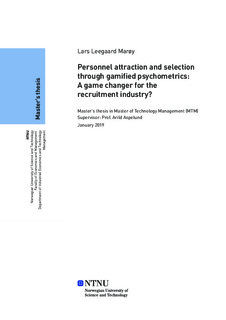| dc.description.abstract | Businesses are fighting in a “war for talent,” and every single hire of a key employee is a battle of increasing strategic importance. Recruiters working in the $200 billion a year global recruitment industry help their clients in personnel attraction and selection by using a number of tools and techniques. Many of them are labour intensive and costly for the hiring organizations, who regardless have few good alternatives to paying the recruitment agencies a premium for their services.
Tech startups are now entering this scene. They offer a new take on the processes of talent attraction and identification, with products and services ranging from digitizing the steps involved in traditional hiring, to completely changing these procedures through the use of emerging technology.
Of the latter category are Pymetrics and Knack.it Corp, two US-based providers of game-based psychometric assessments for personnel attraction and selection. Their ambition is to change the rules of the recruitment game, by bringing the candidates´ potential to the foreground, at the expense of their background.
Case studies of the two services and a following focus group discussion with Norwegian industry experts were designed to answer the questions: “Which are the potential benefits and limitations of gamified psychometrics for recruitment and selection? How likely is the prospect of game-based assessment providers disrupting the recruitment industry?”
Regarding the former, the increased attraction force associated with game-based solutions over traditional non-game-based tools stands out as a significant benefit for the new tools, especially when dealing with candidates at the higher tiers of the job market. In the rest of the market, where the number of applicants can be overwhelming, the game-based tools can automate the now labour-intensive processes of designing and administrating psychometric tests, increasing their practical utility.
Out of the many possible limitations concerning the use of game-based psychometric tests, I find the algorithmic aversion to be one of the most substantial. Recruiters are concerned that candidates and hiring managers alike will be sceptical to the use of games as a medium for administering tests, and also to the recommendations made by the algorithms.
The focus group participants were positive to including such game-based solutions as part of their traditional processes yet limited to the hiring of specific categories of candidates (typically for junior positions). They did, however, not see an imminent threat in Pymetrics or Knack or similar providers disrupting the business of recruitment.
If my informants are representative of the recruitment industry in general, the risk of disruption is genuine. The recruiters do not consider the newcomers as threats in the high-end market for recruitment services, and I think they are right. The problem is that entrants don’t need to attack a market from the top in order to disrupt it. Classical disruption occurs when new competitors offer cheaper services to clients at the low-end, and move upwards from there. Such is a likely scenario to play out in the case of gamified recruitment. | nb_NO |
